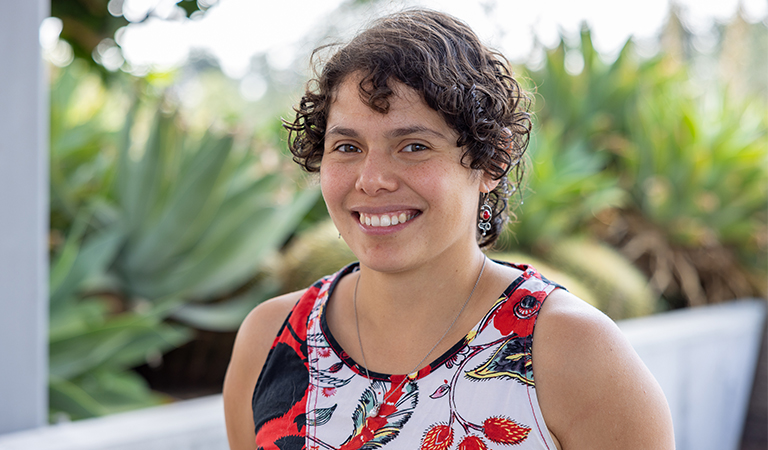Grant Supports Chemistry Teaching and Research
March 25, 2025
Chemistry professor Alicia Hernandez-Castillo has been awarded a prestigious grant from the American Chemical Society’s Petroleum Research Fund, allowing her to further explore the molecular structures of succinimide derivatives while providing invaluable learning experiences for students at Harvey Mudd College.
The grant, set to begin this summer, will support Hernandez-Castillo’s innovative work in molecular spectroscopy, a field that blends experimental and theoretical approaches to analyze molecular structures at a fundamental level. Her research has significant industrial implications—succinimides play a crucial role in engine oil dispersants, helping to prevent sludge and oxidation buildup—which means that students can immerse themselves in applicable research. “Our goal is to understand the molecular structure of the different parts of the polymer chain of the dispersants and how they interact with one another,” says Hernandez-Castillo.
She and her students designed and built a microwave spectrometer that enables them to record high-resolution rotational spectra from 6 to 18 GHz. “Chirped pulse Fourier transform microwave spectroscopy uses state-of-art electronics to produce broadband excitation pulses and detects the molecular response over large spectral ranges in a single measurement cycle that occurs on the microsecond timescale,” Hernandez-Castillo says. “However, in order to analyze our spectra, we carry out ab initio and density functional theory calculations to compare with experiments,”
Hernandez-Castillo and her students have done preliminary work that served as the basis for her application to the Petroleum Research Fund, “including acquiring the rotational spectra of several simpler succinimide and maleimide derivatives,” she says. Two of their papers have been published and a third is in the works.
Notably interdisciplinary, Hernandez-Castillo’s research group comprises eight students from chemistry, physics, engineering and computer science. “Not all of them are involved in this project, but all of them are magnificent, incredibly creative and dedicated,” she says. “Molecular spectroscopy is very multidisciplinary, and I have been incredibly lucky to build a research group at Mudd that reflects that. Getting this grant is a reflection of the hard work of my students, their dedication and the advantages of having students with such a variety of backgrounds.”
Above all, Hernandez-Castillo remains committed to inspiring students. “I love learning new things, and I want to make that process fun and engaging for students, even if sometimes the concepts can be abstract and confusing. I really enjoy seeing a student catch ‘the bug’ for a subject or understand a concept with which they previously struggled. It really makes my day to notice that students are growing as scientists and people.”
